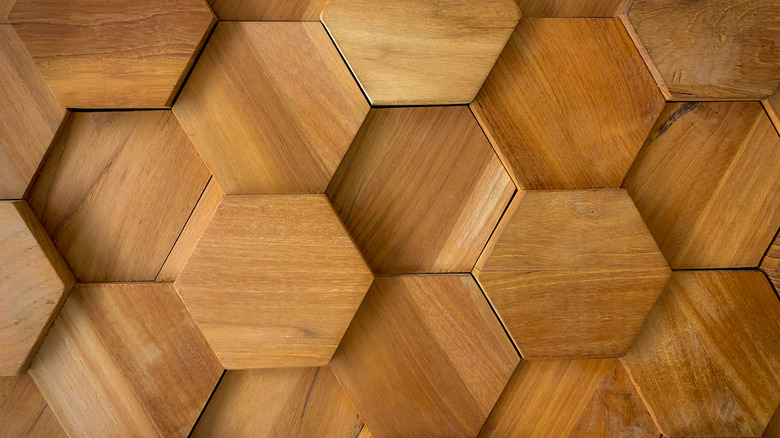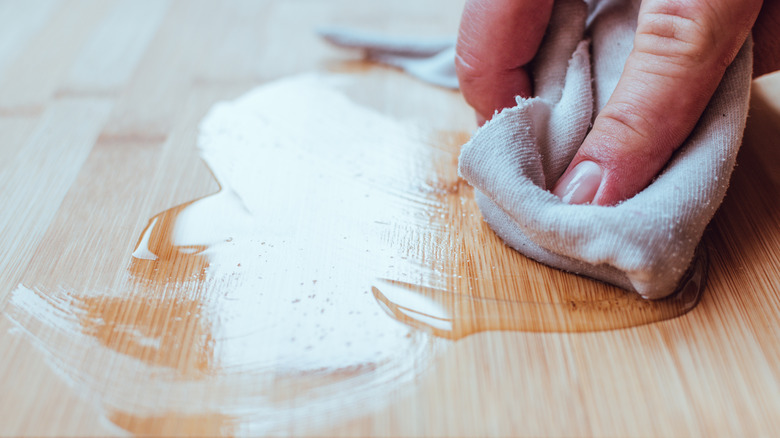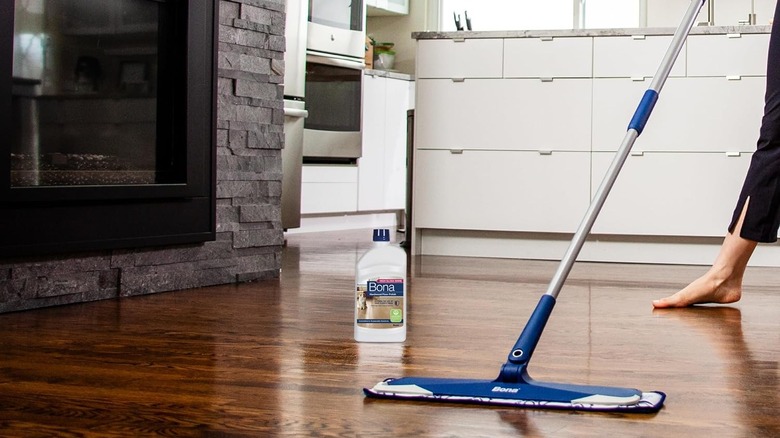Should You Use Beeswax To Make Dull Hardwood Floors Shine?
We may receive a commission on purchases made from links.
If you want hardwood floors that look brand new, you'll need to do daily maintenance along with promptly cleaning up spills and regularly trimming your pet's nails. The best hardwood floors are shiny enough to show off their beautiful color and grain, but aren't so glossy that they show every single scratch. A satin sheen level is the most popular type of hardwood flooring finish because it still reflects light while simultaneously hiding dirt and dust.
Of course, even the most well-maintained hardwood floors can start to get dull over time. If you prefer a natural approach to home maintenance tasks, it's easy to be tempted by inexpensive products with thousands of rave reviews, like the CARGEN Wood Seasoning Natural Beeswax from Amazon. However, according to Skylar Bartlett, owner of Kreer Construction, although beeswax can be used to restore luster to older hardwood floors, it can wreak havoc if yours are already coated with a modern sealant.
"Beeswax can absolutely be used to bring a soft glow back to hardwood, but it really depends on the type of floor and finish you're working with," Bartlett told House Digest during an exclusive interview. "If your floors have an oil-based finish or were originally waxed, it can help nourish the wood and restore some luster," she explained. "But if your floors have a modern polyurethane or water-based topcoat, beeswax isn't the best match." The construction expert added that using beeswax on the wrong finishes can create a cloudy film or prevent future coatings from properly adhering. "It's not a one-size-fits-all fix," she said.
Understand the pros and cons before getting started
There are many ways to bring old hardwood floors back to life, but before covering yours with beeswax, it's important to understand the pros and cons. "On the plus side, it's natural and non-toxic," Skylar Bartlett said during her exclusive interview with House Digest. She also said beeswax naturally moisturizes the wood, which is "especially helpful on older floors or oil-finished hardwoods that tend to dry out over time." This works to add a subtle glow that the construction expert thinks works best for rustic spaces.
But there are some downsides. "It's not compatible with all finishes," Bartlett said. "On polyurethane-sealed floors, it can dull the surface or interfere with refinishing." She also cautioned that you'll need to reapply beeswax regularly because it wears off over time, and it can be downright dangerous when applied incorrectly. "It's slippery if overdone," she explained. "Applying too much can leave a waxy buildup, which becomes slick and hard to clean."
If you're still anxious to use beeswax on your hardwood floors, Bartlett recommended starting with a thorough clean. "Sweep and vacuum to remove dust and debris. Follow with a damp (not wet) mop using a pH-neutral wood floor cleaner." For this, Aunt Fannie's Vinegar-Free Hardwood Floor Cleaner from Amazon gets great reviews. Once your floor is dry, Bartlett urged testing a small area first. Then, use a soft cloth to apply a thin, even layer. "Allow the wax to sit for 20-30 minutes so it can absorb into the wood," she suggested. Finally, buff it with a dry microfiber cloth or floor buffer. "This step is what makes the difference between dull and glowing," she added.
There are better and longer-lasting polishes out there
Despite being a natural and non-toxic way to make hardwood floors shine, Skylar Bartlett told House Digest there are better products than beeswax to achieve the shiny, glossy, polished look you're after. "If your floors have a modern finish, which most do these days, I'd recommend using a polish specifically made for sealed hardwood," she explained during her exclusive interview. "They're designed to bond with the floor's existing finish without buildup."
Bartlett recommends products like Bona Hardwood Floor Polish and Rejuvenate Professional Wood Floor Restorer, both of which cost under $20 from Amazon. The construction expert said these companies both "make great options that are easy to apply and won't cause problems when it's time to refinish down the road." She recommends carefully reading the labels to make sure you pick a product that's safe and compatible with your floor's existing finish.
"If your floors are waxed or oil-rubbed, beeswax might still be a good option," Bartlett said, but she added that you should never use beeswax as a floor polish without checking to see what your hardwood manufacturer or installer recommends. Using the wrong products or tools are just some of the ways you might be damaging your hardwood floors without even noticing. According to Bartlett, beeswax can quickly fall into this category. "The wrong product can do more harm than good long term."


